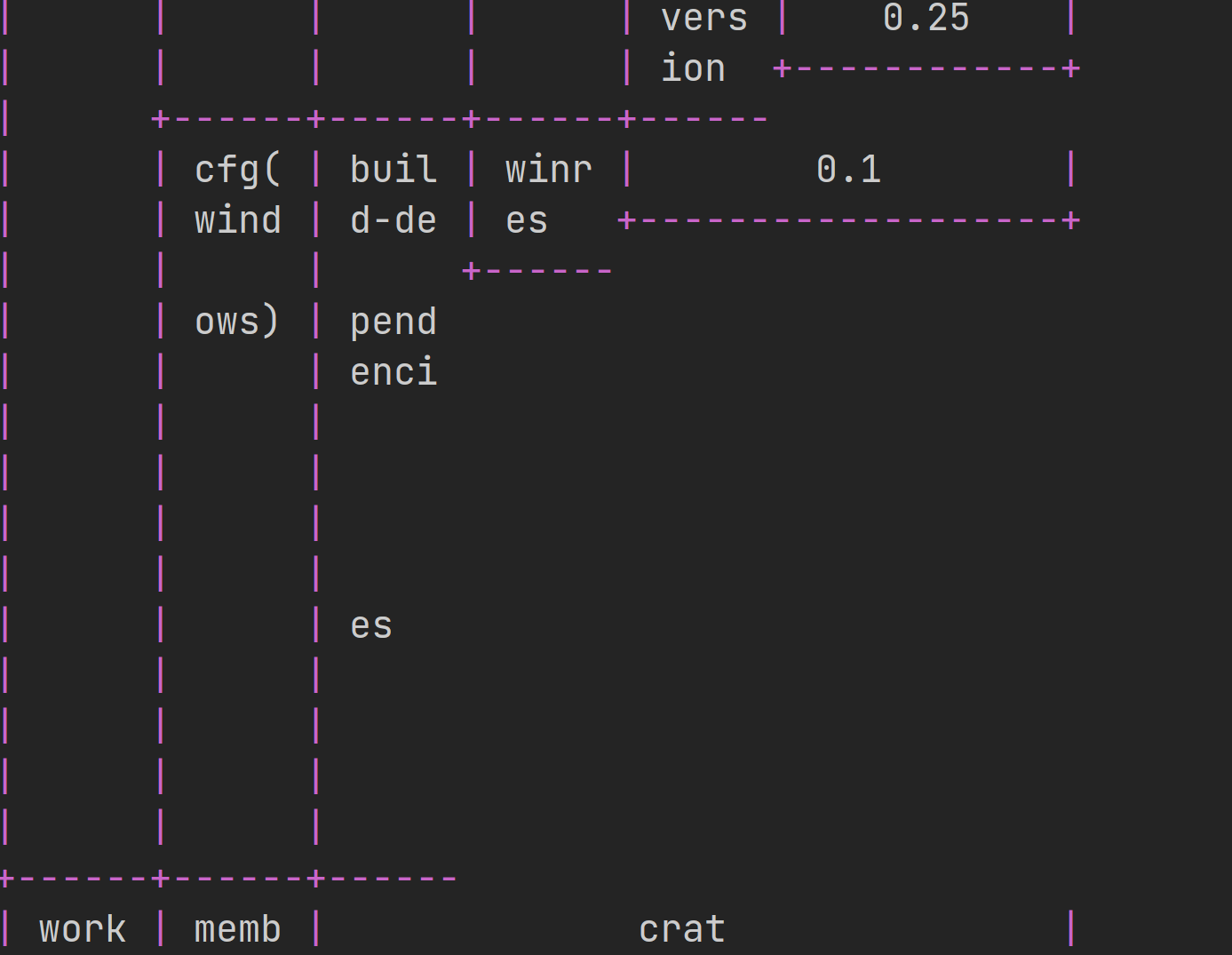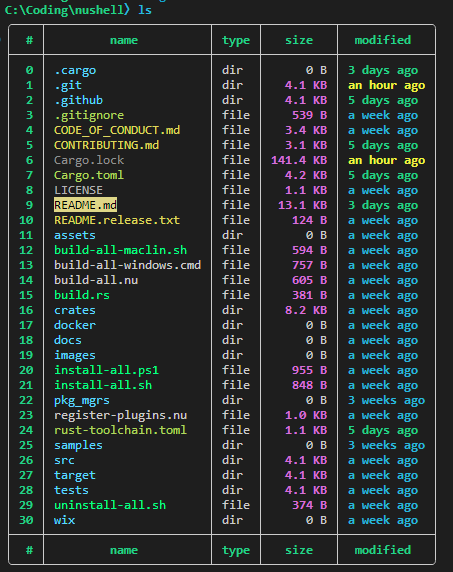# Description
This PR bumps the rust toolchain from 1.66.1 to 1.67.1
# User-Facing Changes
<!-- List of all changes that impact the user experience here. This
helps us keep track of breaking changes. -->
# Tests + Formatting
<!--
Don't forget to add tests that cover your changes.
Make sure you've run and fixed any issues with these commands:
- `cargo fmt --all -- --check` to check standard code formatting (`cargo
fmt --all` applies these changes)
- `cargo clippy --workspace -- -D warnings -D clippy::unwrap_used -A
clippy::needless_collect` to check that you're using the standard code
style
- `cargo test --workspace` to check that all tests pass
- `cargo run -- crates/nu-std/tests/run.nu` to run the tests for the
standard library
> **Note**
> from `nushell` you can also use the `toolkit` as follows
> ```bash
> use toolkit.nu # or use an `env_change` hook to activate it
automatically
> toolkit check pr
> ```
-->
# After Submitting
<!-- If your PR had any user-facing changes, update [the
documentation](https://github.com/nushell/nushell.github.io) after the
PR is merged, if necessary. This will help us keep the docs up to date.
-->
close? #8060
Quite a bit of refactoring took place.
I believe a few improvements to collapse/expand were made.
I've tried to track any performance regressions and seems like it is
fine.
I've noticed something different now with default configuration path or
something in this regard?
So I might missed something while testing because of this.
Requires some oversight.
---------
Signed-off-by: Maxim Zhiburt <zhiburt@gmail.com>
close#8034
So it's actually a work around to do "our best".
We basically try 3 attemps to build a table with each time truncating
values bigger then (termwidth/2, termwidth/4, termwidth/8).
PS1: The logic is kind of not ideal need to think about it.
_______________
PS2:
I've just noticed that multi-line key behaves strangely; (not sure
whether it's caused by this wrap (unlikely))
Need to investigate this.
I'd bet it's a multiline key.

---------
Signed-off-by: Maxim Zhiburt <zhiburt@gmail.com>
close#8033
So as I said they suppose to be there;
I've basically added a change of style if --collapse is used.
PS: I guess it's worth to add tests so hold on if you'll plan to merge
it.
---------
Signed-off-by: Maxim Zhiburt <zhiburt@gmail.com>
# Description
This PR bumps the required rust version to 1.66.1.
# User-Facing Changes
# Tests + Formatting
Don't forget to add tests that cover your changes.
Make sure you've run and fixed any issues with these commands:
- `cargo fmt --all -- --check` to check standard code formatting (`cargo
fmt --all` applies these changes)
- `cargo clippy --workspace -- -D warnings -D clippy::unwrap_used -A
clippy::needless_collect` to check that you're using the standard code
style
- `cargo test --workspace` to check that all tests pass
# After Submitting
If your PR had any user-facing changes, update [the
documentation](https://github.com/nushell/nushell.github.io) after the
PR is merged, if necessary. This will help us keep the docs up to date.
fix#7858
Once again we here 😞
~~I am thinking is there some files with not flat structure we could use
to test table -e?
I mean it is clear it was a while ago were we had to create at least
some tests.
Do you have anything in mind (or maybe commands which is consistent
across systems)?~~
Take care
Signed-off-by: Maxim Zhiburt <zhiburt@gmail.com>
I have changed `assert!(a == b)` calls to `assert_eq!(a, b)`, which give
better error messages. Similarly for `assert!(a != b)` and
`assert_ne!(a, b)`. Basically all instances were comparing primitives
(string slices or integers), so there is no loss of generality from
special-case macros,
I have also fixed a number of typos in comments, variable names, and a
few user-facing messages.
ref #7598
To be honest I was not able to obtain such results in basic mode as you
@rgwood.
But I've got it in `table -e`.
So this must fix the `table -e` wrapping.
Could you verify if it got fixed?
Signed-off-by: Maxim Zhiburt <zhiburt@gmail.com>
close#7591
I tend to think it must be addressed.
But I'd verify it @rgwood.
PS: I've noticed how `table -e` and `table` with the same width wraps a
bit differently sometimes. (I guess it also must be addressed......)
Signed-off-by: Maxim Zhiburt <zhiburt@gmail.com>
> I'm not sure how i feel about that. I mean if there are a lot of
columns, it should probably have a max width so 1 column doesn't take
the entire width of your screen. Ideally it would work closely like
table worked before we migrated to tabled, as far as how column widths
were allocated.
I believe it still not completely matched.
*To be honest I am not against the #7446 approach.
The PR makes a switch between logics on a premise of `termwidth`.
So if `termwidth > 120` we start prioritizing amount of columns we can
show (We try to show as many columns as we can).
Otherwise we do what I've described in #7446 (We show the least columns
but with least truncation involvement).
In case it's OK,
I guess we could make the value configurable.
cc @fdncred
ref #7446
Signed-off-by: Maxim Zhiburt <zhiburt@gmail.com>
# Description
Closes#6909. You can now add closures to your `color_config` themes.
Whenever a value would be printed with `table`, the closure is run with
the value piped-in. The closure must return either a {fg,bg,attr} record
or a color name (`'light_red'` etc.). This returned style is used to
colour the value.
This is entirely backwards-compatible with existing config.nu files.
Example code excerpt:
```
let my_theme = {
header: green_bold
bool: { if $in { 'light_cyan' } else { 'light_red' } }
int: purple_bold
filesize: { |e| if $e == 0b { 'gray' } else if $e < 1mb { 'purple_bold' } else { 'cyan_bold' } }
duration: purple_bold
date: { (date now) - $in | if $in > 1wk { 'cyan_bold' } else if $in > 1day { 'green_bold' } else { 'yellow_bold' } }
range: yellow_bold
string: { if $in =~ '^#\w{6}$' { $in } else { 'white' } }
nothing: white
```
Example output with this in effect:



Slightly important notes:
* Some color_config names, namely "separator", "empty" and "hints", pipe
in `null` instead of a value.
* Currently, doing anything non-trivial inside a closure has an
understandably big perf hit. I currently do not actually recommend
something like `string: { if $in =~ '^#\w{6}$' { $in } else { 'white' }
}` for serious work, mainly because of the abundance of string-type data
in the world. Nevertheless, lesser-used types like "date" and "duration"
work well with this.
* I had to do some reorganisation in order to make it possible to call
`eval_block()` that late in table rendering. I invented a new struct
called "StyleComputer" which holds the engine_state and stack of the
initial `table` command (implicit or explicit).
* StyleComputer has a `compute()` method which takes a color_config name
and a nu value, and always returns the correct Style, so you don't have
to worry about A) the color_config value was set at all, B) whether it
was set to a closure or not, or C) which default style to use in those
cases.
* Currently, errors encountered during execution of the closures are
thrown in the garbage. Any other ideas are welcome. (Nonetheless, errors
result in a huge perf hit when they are encountered. I think what should
be done is to assume something terrible happened to the user's config
and invalidate the StyleComputer for that `table` run, thus causing
subsequent output to just be Style::default().)
* More thorough tests are forthcoming - ran into some difficulty using
`nu!` to take an alternative config, and for some reason `let-env config
=` statements don't seem to work inside `nu!` pipelines(???)
* The default config.nu has not been updated to make use of this yet. Do
tell if you think I should incorporate that into this.
# User-Facing Changes
See above.
# Tests + Formatting
Don't forget to add tests that cover your changes.
Make sure you've run and fixed any issues with these commands:
- `cargo fmt --all -- --check` to check standard code formatting (`cargo
fmt --all` applies these changes)
- `cargo clippy --workspace --features=extra -- -D warnings -D
clippy::unwrap_used -A clippy::needless_collect` to check that you're
using the standard code style
- `cargo test --workspace --features=extra` to check that all tests pass
# After Submitting
If your PR had any user-facing changes, update [the
documentation](https://github.com/nushell/nushell.github.io) after the
PR is merged, if necessary. This will help us keep the docs up to date.
Allows use of slightly optimized variants that check if they have to use
the heavier vte parser. Tries to avoid unnnecessary allocations. Initial
performance characteristics proven out in #4378.
Also reduces boilerplate with right-ward drift.
* nu-table: Refactoring
Signed-off-by: Maxim Zhiburt <zhiburt@gmail.com>
* nu-table: consider space for single `...` column not enough space
Signed-off-by: Maxim Zhiburt <zhiburt@gmail.com>
* nu-table: Fix header style
It did appeared again after my small change...
Signed-off-by: Maxim Zhiburt <zhiburt@gmail.com>
* nu-table: Add a empty header style test
Signed-off-by: Maxim Zhiburt <zhiburt@gmail.com>
* Replace ansi-cut with ansi-str
There's no issues with it we just need to use it later.
Signed-off-by: Maxim Zhiburt <zhiburt@gmail.com>
* Fix color losing in string spliting into Sublines
Signed-off-by: Maxim Zhiburt <zhiburt@gmail.com>
For the width calculations for table layout the `strip_ansi` function
has to be called frequently. By checking for the ASCII control chars
(0x00 to 0x1f) except `\n` that are stripped by `strip_ansi_escapes` the number of
necessary allocations can be reduced significantly for the simple case
of text not containing ANSI escapes.
**Benchmark:**
```
nu -c "for i in 0..1000 { ls } | flatten | table"
```
**Allocation reduction**
Running on the nushell repo root as the directory, this change reduces the
allocation volume by approximately 400 MB
(Measured run via KDE heaptrack)
**Speed improvement to output**
Measured via `/usr/bin/time -v`
*before*
```
Command being timed: "./eager_nu -c for i in 0..1000 {ls} | flatten | table"
User time (seconds): 0.87
System time (seconds): 0.14
Percent of CPU this job got: 87%
Elapsed (wall clock) time (h:mm:ss or m:ss): 0:01.16
Average shared text size (kbytes): 0
Average unshared data size (kbytes): 0
Average stack size (kbytes): 0
Average total size (kbytes): 0
Maximum resident set size (kbytes): 18888
Average resident set size (kbytes): 0
Major (requiring I/O) page faults: 0
Minor (reclaiming a frame) page faults: 4809
Voluntary context switches: 38
Involuntary context switches: 14
Swaps: 0
File system inputs: 0
File system outputs: 0
Socket messages sent: 0
Socket messages received: 0
Signals delivered: 0
Page size (bytes): 4096
Exit status: 0
```
*after*
```
Command being timed: "./lazy_nu -c for i in 0..1000 {ls} | flatten | table"
User time (seconds): 0.63
System time (seconds): 0.14
Percent of CPU this job got: 80%
Elapsed (wall clock) time (h:mm:ss or m:ss): 0:00.97
Average shared text size (kbytes): 0
Average unshared data size (kbytes): 0
Average stack size (kbytes): 0
Average total size (kbytes): 0
Maximum resident set size (kbytes): 18660
Average resident set size (kbytes): 0
Major (requiring I/O) page faults: 0
Minor (reclaiming a frame) page faults: 5149
Voluntary context switches: 24
Involuntary context switches: 5
Swaps: 0
File system inputs: 0
File system outputs: 0
Socket messages sent: 0
Socket messages received: 0
Signals delivered: 0
Page size (bytes): 4096
Exit status: 0
```